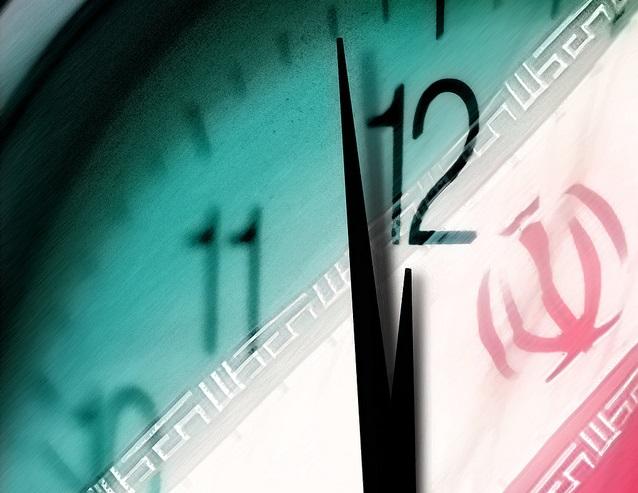It’s not too late for a safer nuclear deal with Iran
Posted By Ahron Shapiro on April 15, 2015 @ 12:30
 [1]
[1]If the recent Iranian nuclear framework deal progresses into an actual signed agreement, it would legitimise Iran as a nuclear weapons threshold state by allowing it to maintain a vast nuclear infrastructure.
The finer points of the deal that remain to be finalised by 30 June are more or less the mechanisms upon which the world would rely to try prevent Iran from weaponising their nuclear material if they so choose—try being the operative word.
Like the ill-fated case of North Korea, this plan depends heavily on inspections. There is little reason to believe it would be more effective this time around.
This was not the kind of deal that US President Barack Obama said would be safe and acceptable in the past. Why is it somehow safe and acceptable now?
The inescapable fact is that President Obama has repeatedly rolled back his requirements for nuclear safeguards on Iran. He has done so for no apparent reason other than that Iran objected to them, and he was determined to get a deal.
In the 2012 Presidential Debate, President Obama was unequivocal. ‘Our goal is to get Iran to recognize it needs to give up its nuclear program and abide by the UN resolutions [against Iran’s illegal nuclear program] that have been in place,’ he said [2], adding that ‘we hope that their leadership takes the right decision, but the deal we’ll accept is they end their nuclear program.’
However, in an interim agreement with Iran, signed in Geneva in November 2013, the US conceded a nuclear program to Iran—provided it only retained the elements required for civilian and peaceful applications.
At the Saban Forum in Washington the following month, Obama volunteered three unacceptable aspects of Iran’s nuclear program that he would target in a final agreement:
‘In terms of specifics, we know that they don’t need to have an underground, fortified facility like Fordow in order to have a peaceful nuclear program. They certainly don’t need a heavy-water reactor at Arak in order to have a peaceful nuclear program. They don’t need some of the advanced centrifuges that they currently possess in order to have a limited, peaceful nuclear program.’
Now, with the Lausanne agreement, keeping Iran’s enrichment consistent with a civilian nuclear program is passé. The stated goal has now become keeping Iran a year away from building a bomb, for a period of 10 years (according to Iran) or 15 years (according to the US).
The only real benchmark that appears to have been used for estimating Iran’s breakout time to a bomb would be the time it would take for Iran’s centrifuges to enrich uranium to weapons-grade levels—a formula based on the idea that Iran will keep a set number of known centrifuges running and thousands of others under a temporary seal, though it would not be required to dismantling any of them. Moreover, it assumed Iran will not utilise its newly developed IR-8 centrifuges, which are up to 20 times more efficient [3] than the IR-1 models it primarily uses for enrichment today [4].
According to all versions of the framework agreement, Iran would not have to close any nuclear facility, including Fordo and Arak, and Iranian Foreign Minister Zarif insists the framework would permit Iran to operate its high-speed centrifuges from the first day the signed deal becomes effective.
This is the deal Iran wanted.
Iran was never willing to discuss its development of intercontinental ballistic missiles, whose sole effective purpose is to deliver nuclear warheads. Nor was Iran willing to negotiate its support for Hezbollah or Hamas, or willing to consider recognising Israel or even to simply stop threatening its annihilation.
Iran’s leaders weren’t willing to negotiate over these issues, and the US didn’t press them to.
Iran has failed to fully comply with every nuclear deal it has agreed to in the past—including the interim deal currently in place. But even if Iran was to adhere to the kind of deal suggested by the Lausanne framework, what would happen after the agreement ends?
What happens if they don’t keep to the deal? President Obama speaks of sanctions that ‘snap back’ into place. This is fanciful—given the complex nature of global economics—and misunderstands the nature of sanctions, which require a long time to have any effect.
As for verification and inspections, there’s no indication that Iran will be willing to give inspectors unfettered ‘anytime, anywhere’ access, nor would any deal be capable of regulating secret nuclear facilities that Iran might choose to construct, as it has in the past.
Moreover, the Lausanne framework ignores the disastrous effect that having Iran legitimised as a nuclear weapon threshold state will have on a Middle East already in turmoil.
Ending Iran’s nuclear program—Obama’s original goal—however challenging, would unquestionably have solved the Iranian nuclear problem. Restricting Iran’s nuclear program to civilian capabilities would have been risky, but arguably manageable.
With the adaptation of the dangerous Lausanne parameters, however, the Obama administration has gambled global security on the mere hope that Iran can be prevented from weaponising in the future, even against its best efforts.
With a signed deal months away at best, and Tehran still very vulnerable to sanctions, it’s not too late to re-open the debate and find a less dangerous alternative that we all can live with.
Article printed from The Strategist: https://aspistrategist.ru
URL to article: /its-not-too-late-for-a-safer-nuclear-deal-with-iran/
URLs in this post:
[1] Image: https://aspistrategist.ru/wp-content/uploads/2015/04/clock-iran.jpg
[2] said: http://www.cbsnews.com/news/transcript-of-final-2012-presidential-debate-part-2/
[3] 20 times more efficient: http://www7.es.irna.ir/en/News/81425885/
[4] the IR-1 models it primarily uses for enrichment today: http://www.washingtoninstitute.org/policy-analysis/view/irans-nuclear-breakout-time-a-fact-sheet
Click here to print.